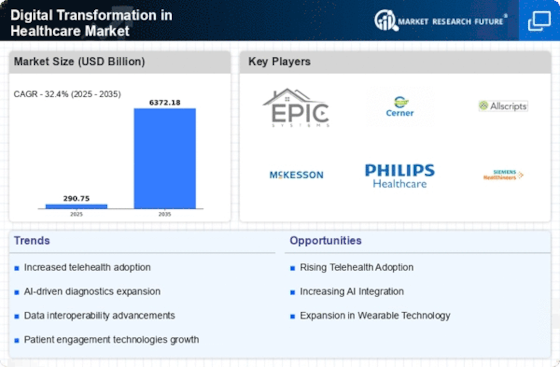Market Analysis
In-depth Analysis of Digital Transformation Healthcare Market Industry Landscape
The Digital Transformation in Healthcare Market is profoundly influenced by various factors that collectively shape its growth and evolution. One of the primary drivers behind the surge in digital transformation within the healthcare sector is the pressing need for improved operational efficiency and patient care. The adoption of digital technologies allows healthcare organizations to streamline administrative processes, enhance communication, and optimize workflows, leading to overall efficiency gains.
The rising demand for patient-centric care is another pivotal factor driving digital transformation in healthcare. Patients now expect more personalized and convenient healthcare experiences, and digital technologies play a crucial role in meeting these expectations. The implementation of electronic health records (EHRs), telemedicine solutions, and mobile health apps contributes to a more patient-centric approach by providing seamless access to medical information and enabling remote consultations.
Technological advancements, particularly in areas like artificial intelligence (AI) and the Internet of Things (IoT), significantly contribute to the digital transformation of healthcare. AI-driven analytics can analyze vast amounts of healthcare data to derive valuable insights, aiding in diagnosis, treatment planning, and personalized medicine. IoT devices, such as wearable health trackers, facilitate continuous monitoring of patients' health parameters, enabling proactive healthcare interventions.
The global push for interoperability and data exchange standards is a crucial factor shaping the digital transformation in healthcare. As healthcare organizations strive to create a connected and collaborative ecosystem, interoperability becomes essential. Standardizing data formats and communication protocols allows different healthcare systems to seamlessly exchange information, leading to better-coordinated care and improved patient outcomes.
Security and compliance considerations play a pivotal role in the digital transformation of healthcare. The sensitive nature of healthcare data makes security a top priority. Healthcare organizations need to implement robust cybersecurity measures to protect patient information from unauthorized access and potential cyber threats. Additionally, adherence to regulatory frameworks, such as the Health Insurance Portability and Accountability Act (HIPAA) in the United States, influences the deployment of digital solutions to ensure compliance and avoid legal repercussions.
The global COVID-19 pandemic has accelerated the digital transformation in healthcare by highlighting the importance of remote care and telemedicine. The need for contactless healthcare services and the ability to monitor and treat patients remotely have become critical during health crises. As a result, healthcare providers are increasingly adopting digital solutions to enhance their capacity for remote patient care and maintain healthcare services continuity.
The competitive landscape and collaborations within the healthcare industry significantly impact the digital transformation market. Collaboration among healthcare providers, technology companies, and startups fosters innovation and the development of integrated digital solutions. Partnerships and alliances contribute to the creation of comprehensive digital platforms that address various aspects of healthcare delivery, from diagnostics to patient engagement.
Government initiatives and policies also play a substantial role in the digital transformation of healthcare. Many governments around the world are investing in healthcare IT infrastructure, promoting the adoption of electronic health records, and incentivizing the use of digital technologies in healthcare delivery. These initiatives aim to enhance overall healthcare efficiency, reduce costs, and improve patient outcomes.
Economic factors, including cost-effectiveness and return on investment, influence the digital transformation in healthcare. Healthcare organizations often evaluate the financial feasibility of adopting digital solutions and assess the long-term benefits in terms of improved patient care, operational efficiency, and cost savings. Demonstrating the economic value of digital transformation initiatives is crucial for widespread adoption in the healthcare industry.


















Leave a Comment